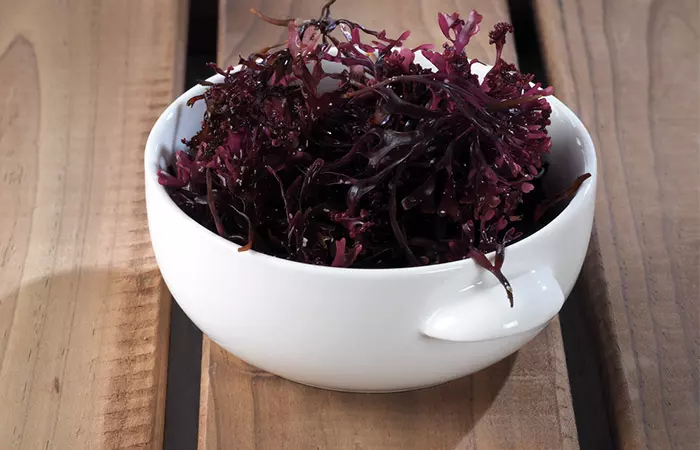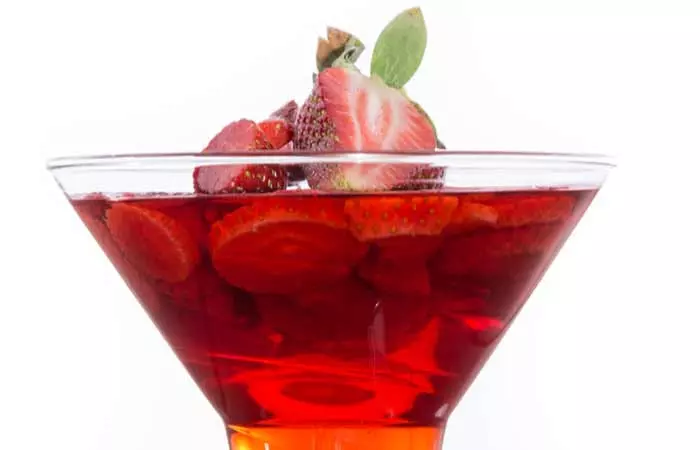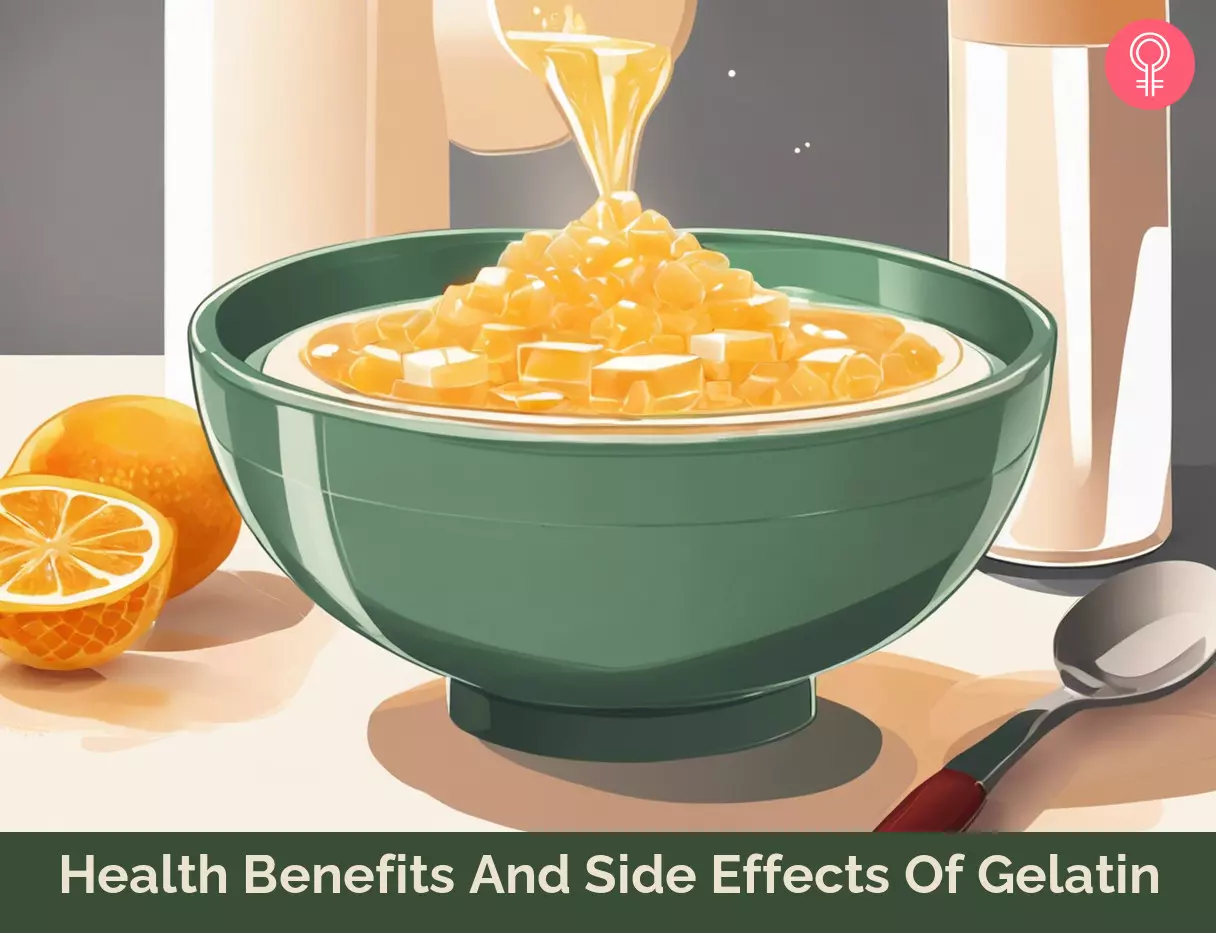What Are Its Benefits? Helps improve bone mineral content, keeps the skin hydrated, and improves memory function. Who Can Use It? Those who want to lose weight and increase their bone density. How Often? Between 8 and 12 grams per day. Caution Some people may experience digestive issues or allergic reactions. It is important to consult with a healthcare provider before consuming it.
Since gelatin is generally derived from animals, it is not vegan. However, there are a few alternatives to gelatin that are not made from animal tissue. Find out what they are in the next section.
Alternatives To Gelatin
Since gelatin generally is made from pig and cow bones, it is not considered to be kosher or halal. Fortunately, there are plant and fruit-based alternatives that are vegan and can be used as a substitute to their meat-based counterpart.
Agar-agar
This variety of gelatin is derived from cooked and pressed seaweed. Seaweed is boiled until it becomes a gel-like consistency, which is later pressed and dried. Once it dries, it is crushed into a fine or flaky powder. You can use agar-agar as a direct substitute for regular gelatin in most of your recipes. However, if your recipe requires citrus fruits like lemons and oranges, you will need to use double the amount required.
Carrageen
This is another variety of vegetarian gelatin that is also made from seaweed (Irish moss).
Pectin
Pectin is fruit-based gelatin that is commonly found in citrus fruits. It is a commonly found ingredient in fruit-based yogurt, that helps enhance the flavor and mouthfeel. It is also used in homemade jams and jellies. You can choose any one of these three varieties of gelatin and add them to your recipe. Now let us see how nutritious gelatin is, in the next section.
Nutrition Values Of Gelatin
Nutritional value of gelation per 100g (1). From the above table, it is quite evident that gelatin is rich in protein and has zero sugar, fat, salt, and carbs. How exactly does this benefit your health? Find out in the next section.
Health Benefits Of Gelatin
Gelatin is rich in proteins, especially collagen and amino acids that benefit your health in numerous ways (2). Let’s find out what some of these potential health benefits are:
Good For Your Bones And Joints
Gelatin contains amino acids like glutamic acid that are known to improve bone health (3). Research on rats suggests that gelatin might be helpful in improving the bone mineral content, thereby strengthening the bones (4). However further studies are required to determine its effectiveness on human bones.
Good For Your Skin And Hair
Gelatin is also a rich source of collagen that is beneficial for your skin health and hair. Studies suggest that collagen may help keep your skin hydrated and moisturized (5). Gelatin might also help increase hair mass and volume. A study on volunteers in the age group of 21-28 years revealed that those who received gelatin supplements saw a 30% increase in hair mass and volume (6). You can explore gelatin hair mask recipes with ingredients like egg yolk, honey, and more. Similarly, you may add nourishing ingredients like aloe vera to your DIY gelatin face masks. Jacqueline, a blogger, shared how her skin and hair improved once she began consuming gelatin. She gushes, “My hair has gotten crazy thick. Crazy, I tell you. My hair was always fairly thin. Lately, though, it takes me twice as long to dry and style my hair. Maybe it’s just my imagination, but I’m thinking my hair is thicker since consuming gelatin. My nail strength and growth have also improved. My nails broke easily and now I couldn’t bite them off if I tried (i).”
Might Benefit Brain And Memory Functions
Gelatin also contains an amino acid called glycine that is known to improve memory function. According to a study, consuming glycine significantly improves the memory of young and middle-aged people (7). The study also suggests that it may help benefit those who are diagnosed with schizophreniai A mental disorder that makes a person interpret reality abnormally and impairs their capacity to think, feel and behave appropriately. and Parkinson’s diseasei A chronic disorder in which parts of the brain are damaged, affecting the nervous system and the body parts controlled by the nerves. . There is a small amount of research to suggest that glycine present in gelatin might also be useful in relieving the symptoms of OCD and body dysmorphic disorderi A mental health disorder where an individual spends a lot of time worrying over flaws in their appearance. (BDD) (8).
May Assist In Weight Loss
Gelatin might be helpful in losing weight as it is rich in protein and contains no carbs or fat. Studies suggest that consuming gelatin releases a hormone called ghrelin that makes you feel full and thereby makes you want to eat less (9). Studies have also shown that a high protein diet helps lower fat levels that might lead to weight loss (10).
Might Help You Sleep Better
Glycine present in gelatin may have therapeutic effects that may help improve your sleep. Research suggests that oral administration of 3 grams of glycine before bedtime may help improve sleep and reduce sleepiness and fatigue during the daytime. Glycine might also help reduce your core temperature and increase the duration of REM sleep (rapid eye movement) (11).
Might Improve Your Digestive Health
Gelatin contains glutamic acid that gets converted to glutamine when absorbed by your body. Glutamine is known to strengthen the lining of your gut wall by reducing its permeability and protecting it from bacterial infection. It may also help reduce inflammation in your gut (12).
Might Slow Down The Growth Of Cancer
Studies on mice have shown that gelatin obtained from pigskin might reduce the size of cancerous tumors and increase life span (13). Further research is required to prove its effectiveness on humans. These potential health benefits of gelatin make it a good addition to your diet. Let us see if there are any side effects to eating gelatin.
Allergies And Adverse Effects
When it comes to allergies, studies suggest gelatin may cause allergic reactions to certain vaccinations that contain gelatin as a stabilizing agent (14). A report by the CDC suggests measles vaccinations that used gelatin as a stabilizing agent may have allergic reactions such as anaphylactic shocki It is the outcome of a strong allergic reaction that lowers blood pressure, narrows the airway, and makes breathing difficult. (15). In the same report, the CDC also states that only a single case of such a reaction has been reported in the USA to date. Further research is required to establish a link between gelatin and its side effects on certain vaccinations. The USFDA has regarded gelatin to be generally safe for consumption (16).
How To Prepare Gelatin At Home
Gelatin can be prepared using the bones and ligaments of various animals. However, pork, beef, and chicken bones are the most commonly used. Here is how you can prepare gelatin at home. Ingredients Required
4-5 pounds of beef, pork, or chicken bones and connective tissue. 1 tablespoon of salt 2-3 liters of water
Preparation Making gelatin at home is fairly simple, but it can be a time-consuming process. If you don’t have the time to make gelatin from scratch, you can buy it from a grocery store. However, if you have made gelatin from scratch, you need to know how to store and preserve it. Learn more about this in the next section.
Tips For Storing Gelatin
Freshly prepared gelatin can be stored for up to a week in the fridge, and up to a year when frozen. You can also add fruit flavoring agents to freshly prepared gelatin and make ice cubes for later use. Let’s put that gelatin to good use with some easy recipes.
Gelatin Recipes
Here are a few simple recipes you can try using freshly made or store-bought gelatin. The first recipe is for homemade jello
1. Homemade Jello
Ingredients Required
4 cups of fruit juice of your choice or fruit concentrate 2 tablespoons of unflavoured gelatin powder 2 tablespoons of honey or agave
Preparation Knowing about jello’s nutritional benefits will give you an edge. Information like its high sugar content and poor protein and fiber (along with fewer vitamins and minerals) can help you decide whether to use it, especially if you are diabetic or cutting down on sugar. The next recipe is for an easy creamy gelatin dessert.
2. Creamy Gelatin Dessert
Ingredients Required
6 ounces of lemon-flavored gelatin 4 cups of water 2 cups of mini marshmallows 4 ripe bananas, sliced 20 ounces of canned pineapple ½ cup of sugar 2 tablespoons of all-purpose flour 2 tablespoons of butter 1 cup of heavy whipping cream ½ cup of chopped walnuts
Preparation
3. Gelatin Gummy Bears
Ingredients Required
½ cup of preferred fresh fruit juice 3 tablespoons of unflavored gelatin 2 tablespoons of honey Gummy bear mold
Preparation Try these recipes at home and enjoy them with your friends and family. In conclusion, gelatin is a protein-based product that is obtained from boiling bones and connective tissues of animals. Vegans can use plant-based gelatin alternatives such as aga-agar, pectin, and carrageenan. Gelatin contains amino acids such as glycine and glutamic acids that give it numerous potential health benefits. It may also help maintain joint health, nail health, hair health, skin health, improve digestion, and assist in wound healing. The US FDA deems gelatin as generally safe to consume. How much gelatin should I take daily? Eating up to 10 grams of gelatin for up to six months is considered safe. Can gelatin tighten skin? Gelatin may help promote skin elasticity and firmness. It may also help reduce the appearance of stretch marks. Which is better: gelatin or collagen? The intake of collagen in supplement form is better when compared with gelatin. At the same time, gelatin is great for preparing desserts or jellies. Is gelatin anti-aging? Gelatin may help reduce the signs of aging. However, limited research is available in this regard.
Illustration: Health Benefits And Side Effects Of Gelatin
Learn more about the potential benefits of gelatin for healthy nail and hair growth. The video below talks about its nutrients, tips, and possible effects on strengthening and nourishing your hair and nails.













